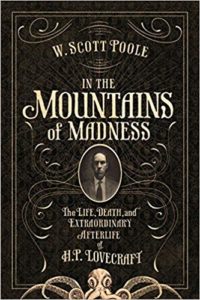 In a previous post I’ve discussed the impact that Howard Phillips (H.P.) Lovecraft has had on horror writing and storytelling for almost a century now. But Lovecraft’s influence goes beyond just literature. Travel to Portland, Oregon, for example, and you will find a Lovecraftian-themed bar. Or go online and buy yourself a cute little figurine of Lovecraft’s most famous monster, Cthulhu. Or go across American and see how many people actually wrote-in Cthulhu as a candidate for President of the United States. How did this happen? How has the imagination and the creations of this weird, somewhat reclusive man become so ubiquitous that we see them (and their tentacles) across all forms of media and entertainment? In the Mountains of Madness: The Life and Extraordinary Afterlife of H.P. Lovecraft by W. Scott Poole helps provide some answers to those questions.
In a previous post I’ve discussed the impact that Howard Phillips (H.P.) Lovecraft has had on horror writing and storytelling for almost a century now. But Lovecraft’s influence goes beyond just literature. Travel to Portland, Oregon, for example, and you will find a Lovecraftian-themed bar. Or go online and buy yourself a cute little figurine of Lovecraft’s most famous monster, Cthulhu. Or go across American and see how many people actually wrote-in Cthulhu as a candidate for President of the United States. How did this happen? How has the imagination and the creations of this weird, somewhat reclusive man become so ubiquitous that we see them (and their tentacles) across all forms of media and entertainment? In the Mountains of Madness: The Life and Extraordinary Afterlife of H.P. Lovecraft by W. Scott Poole helps provide some answers to those questions.
Equal parts biography, psychoanalysis, and literary/cultural analysis, In the Mountains of Madness manages to not read like an academic book despite it’s academic tone. Poole explores many topics about Lovecraft and his life in this book, including topics that he believes other scholars have either ignored or have handled so poorly in the past that they deserve a re-examination. Among other topics, Poole discusses Lovecraft’s racist attitudes, how a group of dedicated friends kept his writings in print after his death, and treats Sarah Susan Lovecraft, Howard’s mother, and his aunts to a seemingly more balanced analysis of the impact they had on Lovecraft’s life. The whole last third of the book is dedicated to Lovecraft’s impact on our culture, from Lovecraft-themed conventions, rock bands, video games, and so, so much more.
But the part of the book I really appreciated the most is Poole’s personal guide to reading Lovecraft. Deciding to read Lovecraft is a bit of a daunting task to undertake. Where exactly should you start? As a reader who has been reading quite a bit of Lovecraft recently I highly recommend looking at Poole’s guide, not only because it is a helpful place to start but because Poole gives a one-to-two sentence summary for each story. Based on his recommendations, I apparently started at the deep end by reading At the Mountains of Madness first. So don’t be like me. Read this book, look over his list, and then start reading Lovecraft yourself and see what all the fuss is about.
